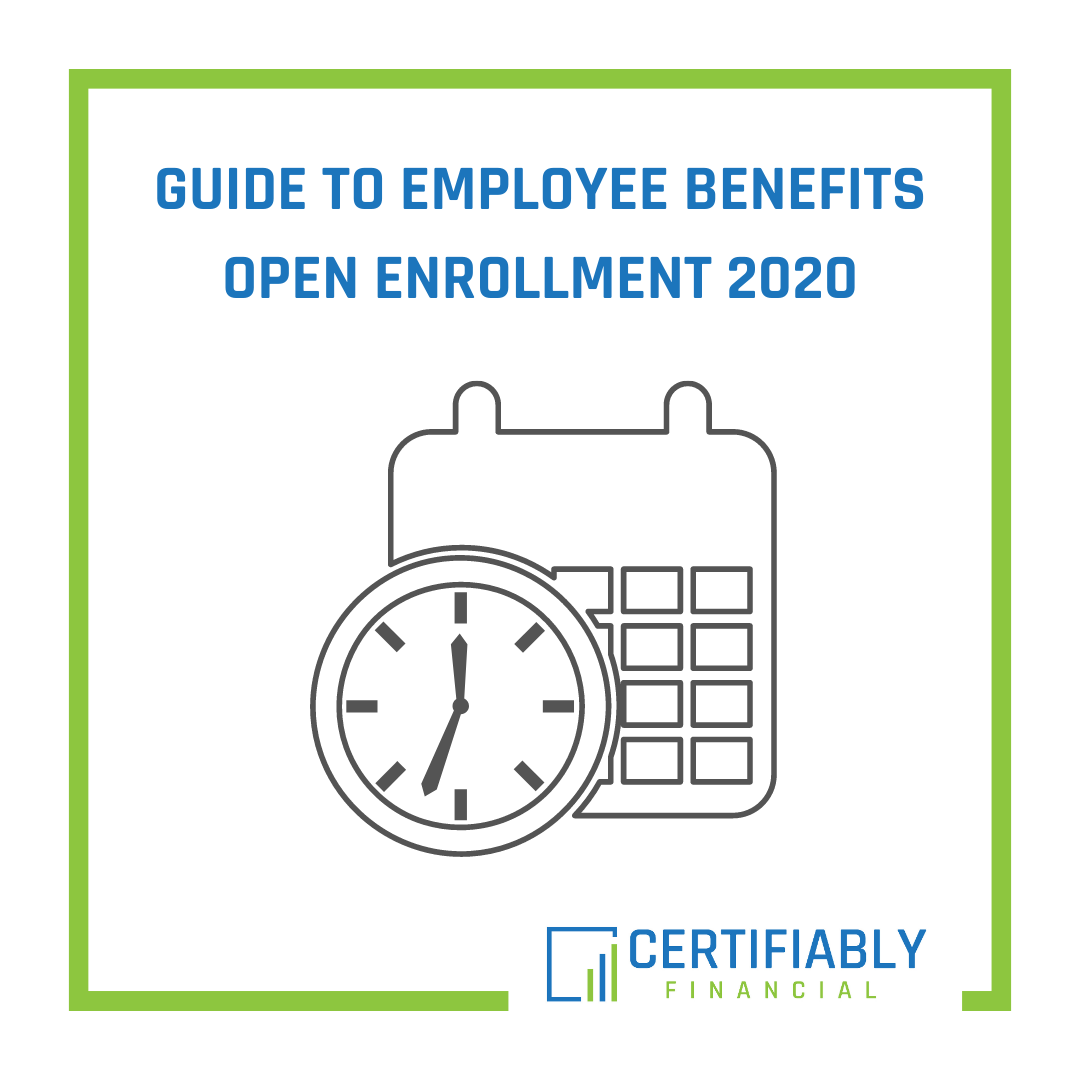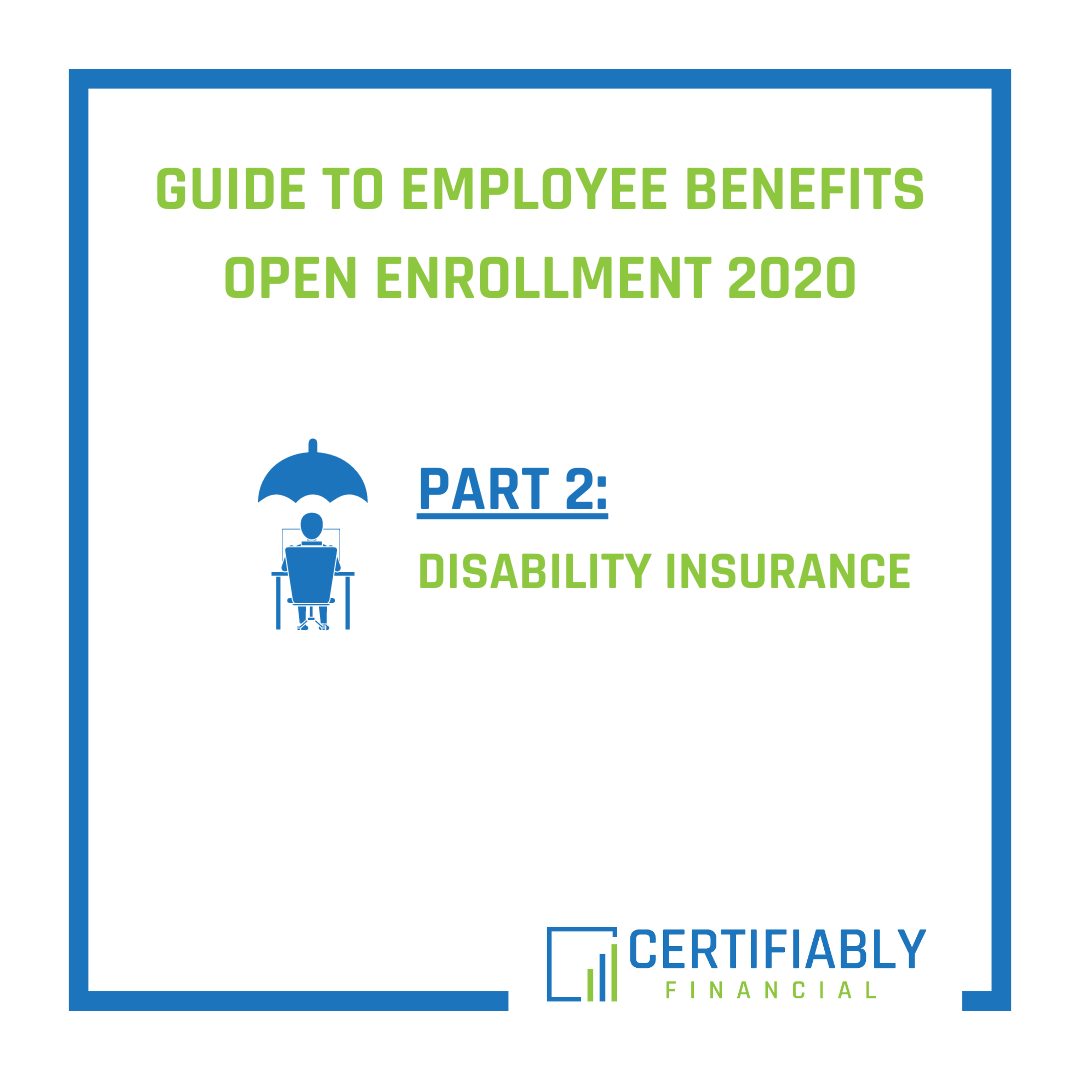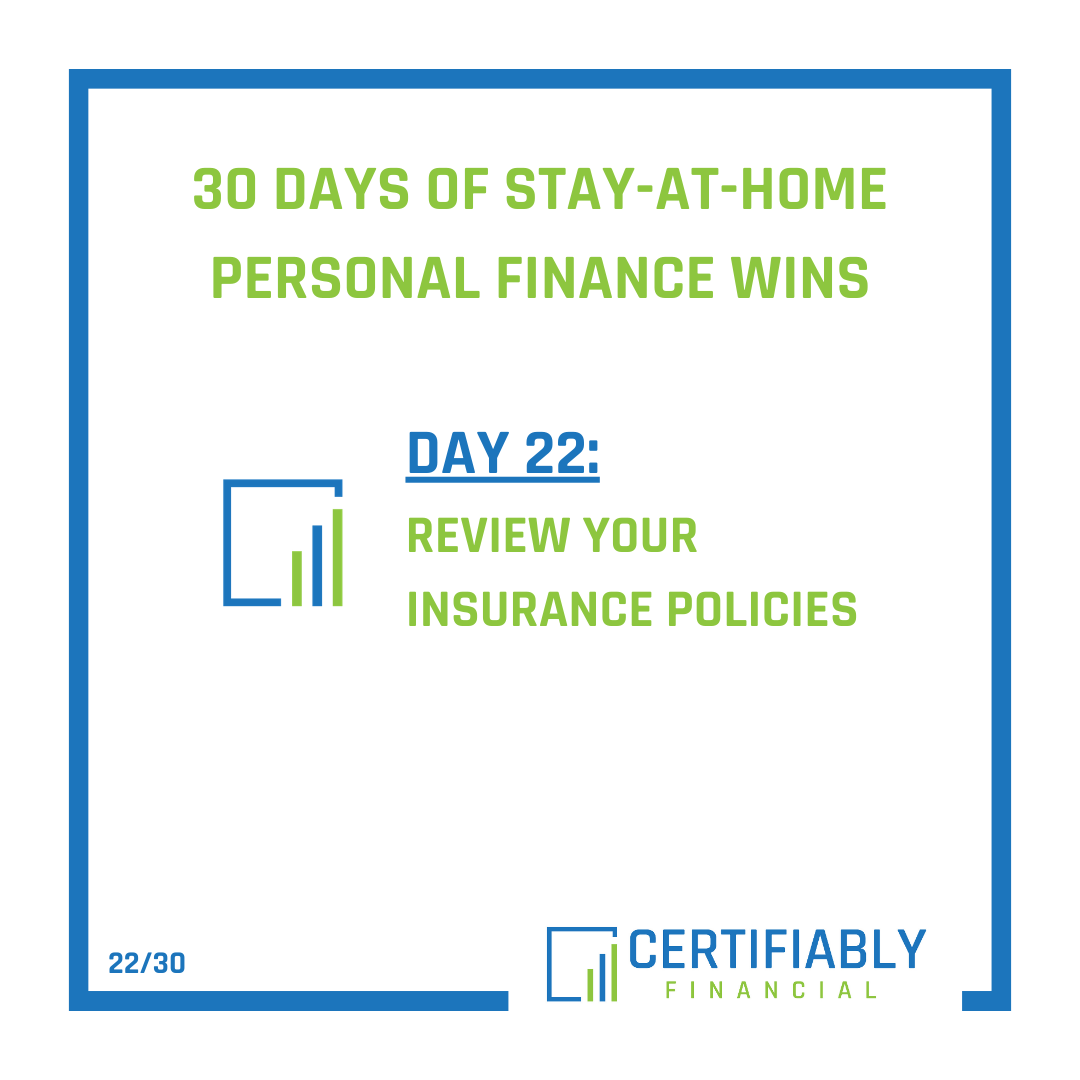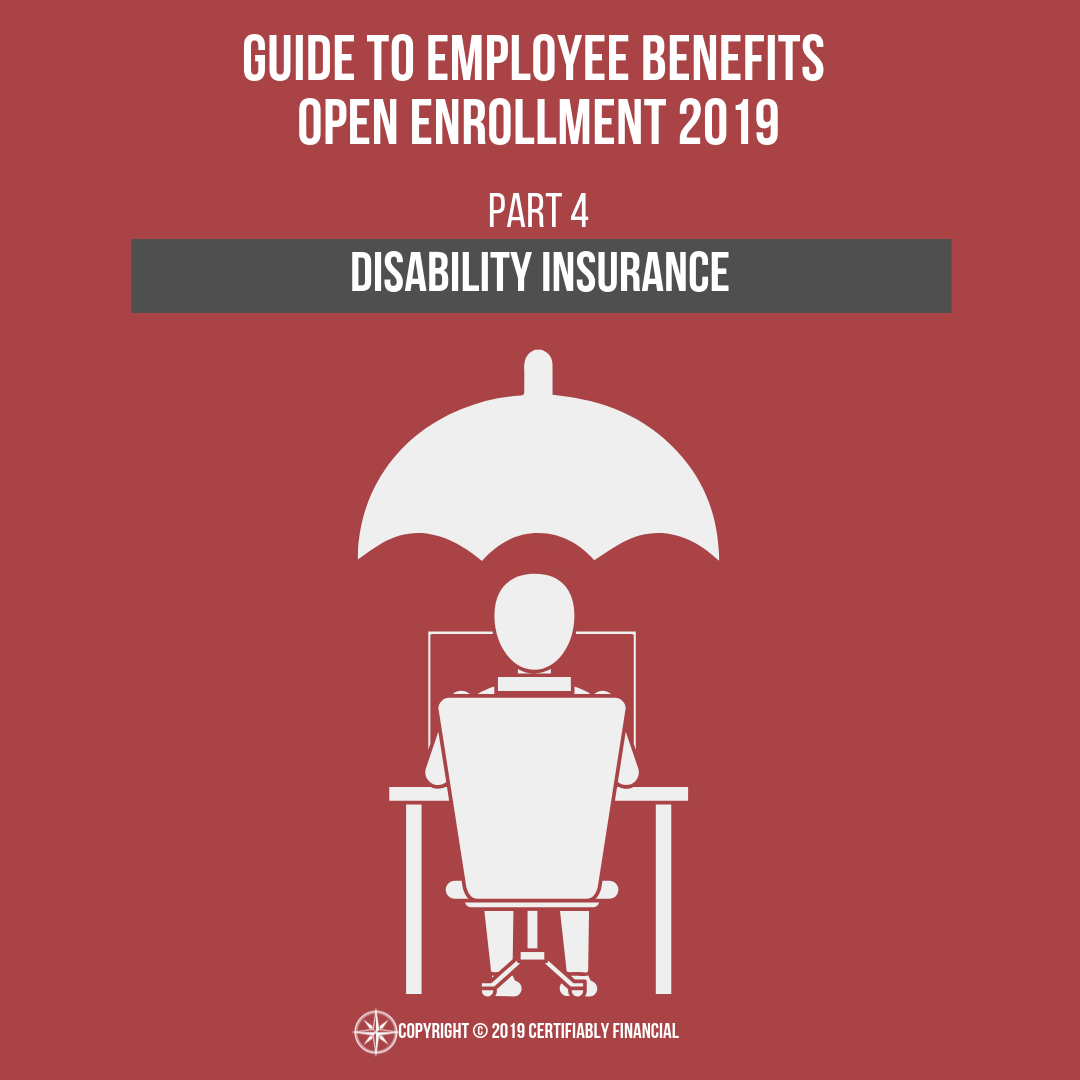Employee benefits open enrollment can be confusing for a lot of people. There are a lot of options to choose from that probably seem like they’re in a different language. My past 5 blog posts have dived into various employee benefits including health insurance, disability insurance, group term life insurance, Dependent Care FSA, and other ancillary benefits to help empower you to make a more educated decision when making your selections for the next year. Personal finance is just that – personal.
Disability Insurance
Guide to Employee Benefits Open Enrollment 2020: Disability Insurance
Running your household takes a lot of money. From your mortgage to your car payment to your groceries, it all adds up. And we haven’t even mentioned the other expenses you have to pay for to maintain your lifestyle like daycare or eating out or entertainment. Now imagine trying to pay for those things without an income and with no ability to earn. How long would your savings last? What would happen once you spend down your emergency fund?
Day 22 Of 30 Days Of Stay-At-Home Personal Finance Wins: Review Your Insurance Policies
What if you were able to come out of this time of social distancing and economic crisis with a stronger and healthier financial life? What if you looked at this as an opportunity to take a little bit of your extra time each day to work on your finances?
Re-post: Guide to Employee Benefits Open Enrollment 2019 Part 4: Disability Insurance
While having proper disability insurance coverage in place is one of the most important parts of a solid financial foundation, unfortunately, it’s something that I find most people don’t think is important and don’t want to pay for. It usually doesn’t become apparent how important it really is to have disability insurance in place until something happens and you have a need for it. Life can change in the blink of an eye. If you’re in an accident and not able to work, then how would you pay your bills and support your family?
Guide to Employee Benefits Open Enrollment 2019 Part 4: Disability Insurance
Running your household takes a lot of money. From your mortgage to your car payment to your groceries, it all adds up. And we haven’t even mentioned the other expenses you have to maintain your lifestyle like daycare or eating out or entertainment. Now imagine trying to pay for those things without an income and with no ability to earn. How long would your savings last? What would happen once you spend all that money?
The Most Useful Employee Benefits That You’re Not Taking Advantage Of
3 minute read
Of course, not all of these benefits are available to everyone and I haven’t included things such as life insurance because almost everyone signs up for it. Below, I’ve listed benefits that I often see people not taking advantage of when they really should be.
High Deductible Health Plan (HDHP) Paired with a Health Savings Account (HSA)
Although HDHPs may seem scary on the surface, they can provide great benefits to those who are healthy, especially when combined with an HSA. Not only can HDHPs save you money through lower premiums if you don’t visit the doctor often, but many HDHPs that are offered as an employee benefit are HSA-eligible.
HSAs are currently the most tax-advantaged accounts out there. They can be used as a means to save for and pay for any qualified medical expenses in a tax-free manner or you can strategize to use them as the only tax-free savings vehicle available to you. Additionally, if an HSA is available to you, then your employer likely offers to contribute to it on your behalf which ultimately lowers the cost of heath care for you even further.
Pre-Tax Dependent Care Benefits Through Dependent Care Flexible Spending Account (FSA)
If you’re paying for dependent care, then this is a no-brainer. You’re already paying for daycare, it’s really expensive, and you’re paying for it with after-tax dollars. If your employer offers a dependent care FSA, then you can contribute up to $5,000 to the account pre-tax for those married and filing jointly, or $2,500 for single taxpayers and those married filing separately, and then reimburse yourself tax-free.
If you are a married filing jointly taxpayer in the 24% tax bracket and you contribute $5,000 to a dependent care FSA, then you could save $1,200 on your taxes. There’s no reason not to take advantage of this if it’s available to you.
Long-Term Disability Insurance
According to the Social Security Administration, 1 in 4 of today’s 20-year-olds will become disabled before they retire. Many people don’t have disability insurance in place simply because they don’t know what it is, or they think they’ll never need it, but it could be disastrous if you end up needing it and you don’t have coverage in place. If you become disabled due to a freak accident, a disease, or mental health condition and can’t work, then how will you earn money, put food on the table, or provide for your family until you reach Social Security age? This is exactly what disability insurance protects against.
Not all disability insurance policies are written the same, and the devil is in the details when it comes to the policies, so it’s worth exploring private policies as well.
Vacation
As a whole, American companies offer fewer vacation days than many other nations. Yet, Americans still leave many of these days on the table. In fact, over half of Americans report having unused vacation days left over at the end of the year. Why? Even if you’re not going on vacation take that time to spend time with your family, enjoy your hobbies, or just relax.
The way I see it is that if your boss values you less for taking all of your vacation days than someone who doesn’t take all of their days, then you need to find a new boss.
Be a little more intentional when making your employee benefits elections. If there’s no one there to help you and answer your questions, then reach out to someone you trust who has knowledge about the benefits being offered to you and can accurately answer your questions.
Don’t Lose Your Insurance
2 minute read
The coverages don’t go away in every situation, but most of the time they will. Some employers do allow you to take your policies with you, but you usually have to be willing to pay the full price of the coverage without any of the subsidization that your employer was previously providing.
Having private insurance policies can be beneficial to those who need them because they remain portable no matter where you work, or if you work. As long as you continue paying the premiums, your coverage will continue.
Portability
Private insurance is something to look in to as you begin looking at your open enrollment options. Do you really want to have all of your life and disability insurance tied to your employment? If something were to happen to your employer and they had to terminate your position, then you’d be left without coverage. Maybe you want to quit your job to travel the world, start your own business, or you’re switching to a new employer that doesn’t offer insurance benefits.
You’ve got a mortgage, a family to support, and you’ve lost your insurance benefits that go along with the job that you no longer have. If something were to happen to you it would now be up to your spouse (or whoever that would be in your situation) to figure out how to pay the mortgage, run the household, and get the kids through school and extracurriculars. That would be pretty tough without any funds to support them through this.
Medical Underwriting
Having private insurance can help you eliminate any chance of something like this happening. If you get private insurance wen you’re young and healthy, then you’ll never have to go back through medical underwriting again when you’re older and potentially have developed health issues, unless you need additional coverage or a longer term. The insurance policy will last as long as the term states, if you pay your premiums. Some people end up paying astronomically for life and disability insurance because they have to go through medical underwriting at a later age when they lose their employer-provided policies or realize that they need some coverage in place. They could probably have eliminated the higher costs by getting insured at an earlier age.
Independent Agent
As you go through the benefits offered to you during open enrollment and determine the amount of life and disability insurance coverages that you need, consider comparing the costs and benefits of private policies versus those of your employer-provided policies. As always, I recommend working with an independent insurance agent who can obtain quotes from you from many different insurance companies rather than only being able to write policies from their employer.
The big insurance companies that you see advertised everywhere (you know who they are) will almost always cost more because they spend so much on advertising and other things that smaller companies don’t. Additionally, agents of these companies are limited to selling you products from their employer rather than being able to shop rates from multiple different insurers for you. An independent agent can actually work to find the cheapest policy for you that provides the benefits that you need because they can run quotes from multiple companies and compare policies.
Do You Have Disability Insurance?
1 minute read
Perhaps this injury causes any number of problems which prevents you from working. What do you do? How do you support your family? How do you pay your bills?
Disability insurance is an area where I find most people are not properly protected. You’re more likely to become disabled prior to age 65 than to die. According to the Social Security Administration, 1 in 4 of today’s 20-year-olds will become disabled before they retire.
If something happens to you (you hurt your back, disease/illness, car accident, etc.) and you’re not able to earn income, then how are you going to support your family?
The devil is in the details when it comes to disability insurance policies. Most policies I see issued have a definition of disability of “any occupation”. This means that the policy will only pay if you’re not able to perform any occupation. If you’re a nurse and lose the use of your hands or an accountant and become mentally disabled, but you can still go be a greeter at Walmart, then the policy won’t pay.
On the other hand, an “own occupation” definition of disability means that the policy will pay if you aren’t able to perform your own job duties, no matter if you could still perform another job.
If you have a disability insurance policy, did you read through the details when you took it out? If you don’t have a disability insurance policy, why not?







